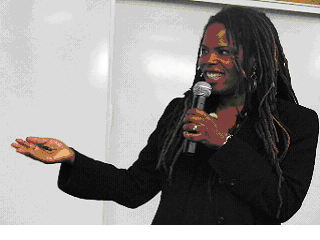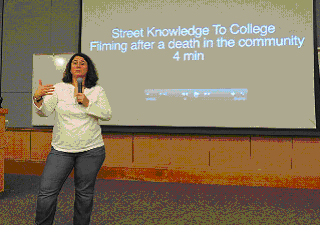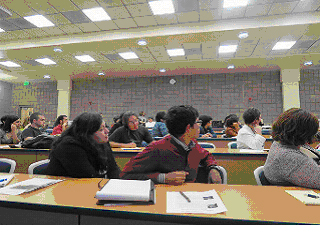By Ishmael Ramirez and Alexandra Rangel
Photos by Brandy Ronek
IMPERIAL, Calif.--Award-winning documentary filmmakers were featured speakers before a local audience of more than 50 students, artists, and journalists at Imperial Valley College on Saturday Feb. 18 in the first Sundance Institute documentary filmmaking workshop for storytellers that included instructing participants in how to secure artistic and financial support.
"We support artists of independent vision who are inspired to make whatever their story is," Rahdi  Taylor, associate director of the documentary film program at Sundance, said. The renowned Utah-based organization funds an international range of 30 to 40 artists every year with more than $1 million in grant-funding, although Taylor said there are no prerequisites to apply for a grant.
Taylor, associate director of the documentary film program at Sundance, said. The renowned Utah-based organization funds an international range of 30 to 40 artists every year with more than $1 million in grant-funding, although Taylor said there are no prerequisites to apply for a grant.
"We don't care, per se, whether or not you've attended film school, or have certain kinds of degrees and experiences," Taylor said during the workshop introduction. "You do have to have the material, the work that speaks for itself. It's about the work, and it's about the passion of the artist."
Sundance-funded filmmaker Jennifer Maytorena Taylor advised workshop participants on how to establish a rapport with the people being filmed in a documentary. Maytorena Taylor showed clips of  the award-winning "Paulina," a film she co-produced in 1998 with Vicky Funari, chronicling the lifelong hardships of a woman from Veracruz, Mexico, who was sold by her parents into slavery at a very young age.
the award-winning "Paulina," a film she co-produced in 1998 with Vicky Funari, chronicling the lifelong hardships of a woman from Veracruz, Mexico, who was sold by her parents into slavery at a very young age.
In order to get the precise emotion and footage Maytorena Taylor wanted for the film, she said she had to establish a trusting relationship with the title subject, Paulina Cruz Suarez. Maytorena Taylor and her crew needed to make Paulina feel comfortable, because she would frequently become emotional during filming and interviewing. Producing Paulina's story took more than three years.
The IVC/Sundance workshop, which was also co-presented by the Imperial County Film Commission, was a means of learning artistic methods for participants like students from the documentary film class at Universidad Autonoma de Baja California in Mexicali, Mexico, headed by instructor Paulina Castro.
"The tips were really good," said Castro. "I loved the comparison of techniques between Ray and Jennifer," she said. "It was very good to get both the male and female perspective."
Jennifer," she said. "It was very good to get both the male and female perspective."
Richard Ray Perez, the second documentary presenter at the workshop, tutored attendees in a timeline method of storytelling—specifically with his documentary story of labor leader Cesar Chavez during a 36-day fasting odyssey in the 1980s, and weaving Chavez's personal 65-year history into the storyline.
Sundance chose the Imperial Valley as its first documentary workshop venue because of its so-called "underserved" locale.
"There's so much to be told," said former high school science teacher Vincent Suerta, who was in attendance. "The field is so open, and there is nothing coming out of here. No movies. No books. This is where the real stories are rooting from."
While Sundance chose the Imperial Valley for its first documentary workshop venue, another Sundance program—Film Forward—will present a documentary event from May 1-4 in conjunction with the second annual Imperial Valley Film Festival and Artists Showcase.
Alexandra Rangel, Ishmael Ramirez and Brandy Ronek are journalism students at Imperial Valley College.


